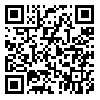Sat, Apr 5, 2025
[Archive]
Volume 21, Issue 1 (March 2025)
IJEEE 2025, 21(1): 3333-3333 |
Back to browse issues page
Download citation:
BibTeX | RIS | EndNote | Medlars | ProCite | Reference Manager | RefWorks
Send citation to:



BibTeX | RIS | EndNote | Medlars | ProCite | Reference Manager | RefWorks
Send citation to:
Jalalian-Ebrahimi M, Shamsi-Nejad M A. Enhancing Misalignment Tolerance in Inductive Power Transfer System to Maintain Stable Power Transfer and Improve the Efficiency for Battery Charging. IJEEE 2025; 21 (1) :3333-3333
URL: http://ijeee.iust.ac.ir/article-1-3333-en.html
URL: http://ijeee.iust.ac.ir/article-1-3333-en.html
Abstract: (2614 Views)
This paper proposes an inductive power transfer (IPT) system to maintain stable power transfer and improve efficiency for battery charging performance across a wide range of coupling coefficient variations. The proposed IPT system uses series-series (S-S) and series-inductor-capacitor-inductor (S-LCL) compensation. In both compensation configurations, the rectifier operates in half-bridge (HB) and full-bridge (FB) modes. By using the correct switching pattern between compensation networks and the rectifier, four transfer power-coupling coefficient (P-k) curves are created. A 400 W prototype simulated in MATLAB demonstrates that, with the proposed method, output power fluctuation is limited to only 3% for coupling coefficients varying from 0.1 to 0.4, with system efficiency ranging from 80% to 95.9%. Compared to other methods, the proposed structure provides stable power transfer over an ultra-wide coupling variation and does not require special coil design, clamp circuit design, or complex control.
Keywords: Inductive Power Transfer (IPT), transfer power-coupling coefficient (P-k), Misalignment Tolerance, Power Fluctuation, Coupling Variation.
Type of Study: Closed - 2023 Special Issue on Application of Electric Vehicles in Smart Energy Systems |
Subject:
Power Electronics Applications
Received: 2024/06/15 | Revised: 2025/03/11 | Accepted: 2024/12/14
Received: 2024/06/15 | Revised: 2025/03/11 | Accepted: 2024/12/14
| Rights and permissions | |
 |
This work is licensed under a Creative Commons Attribution-NonCommercial 4.0 International License. |







